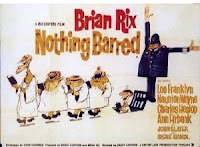Yesterday the papers were full of the news that the World Health Organization had been sent an open letter signed by 150 health experts calling for this summer's Olympics to be moved from Rio de Janeiro or postponed.
The experts fear the virus could spread more rapidly around the world because of the influx of Olympic visitors to the Brazilian city, which has a high incidence of the disease Zika.
Today, as I expected, the great and good are telling us not to worry our little heads.
BBC News reports:
Senior WHO official Bruce Aylward told the BBC that risk assessment plans were in place, and reiterated that there was no need to delay the Games.
The mayor of Rio said disease-carrying mosquitoes were being eradicated.I expected it because I have seen Jaws (and Peter Benchley had obviously seen An Enemy of the People).
It all sounds very dangerous to me. Just take a look at the opening titles of the original Survivors series above.




















